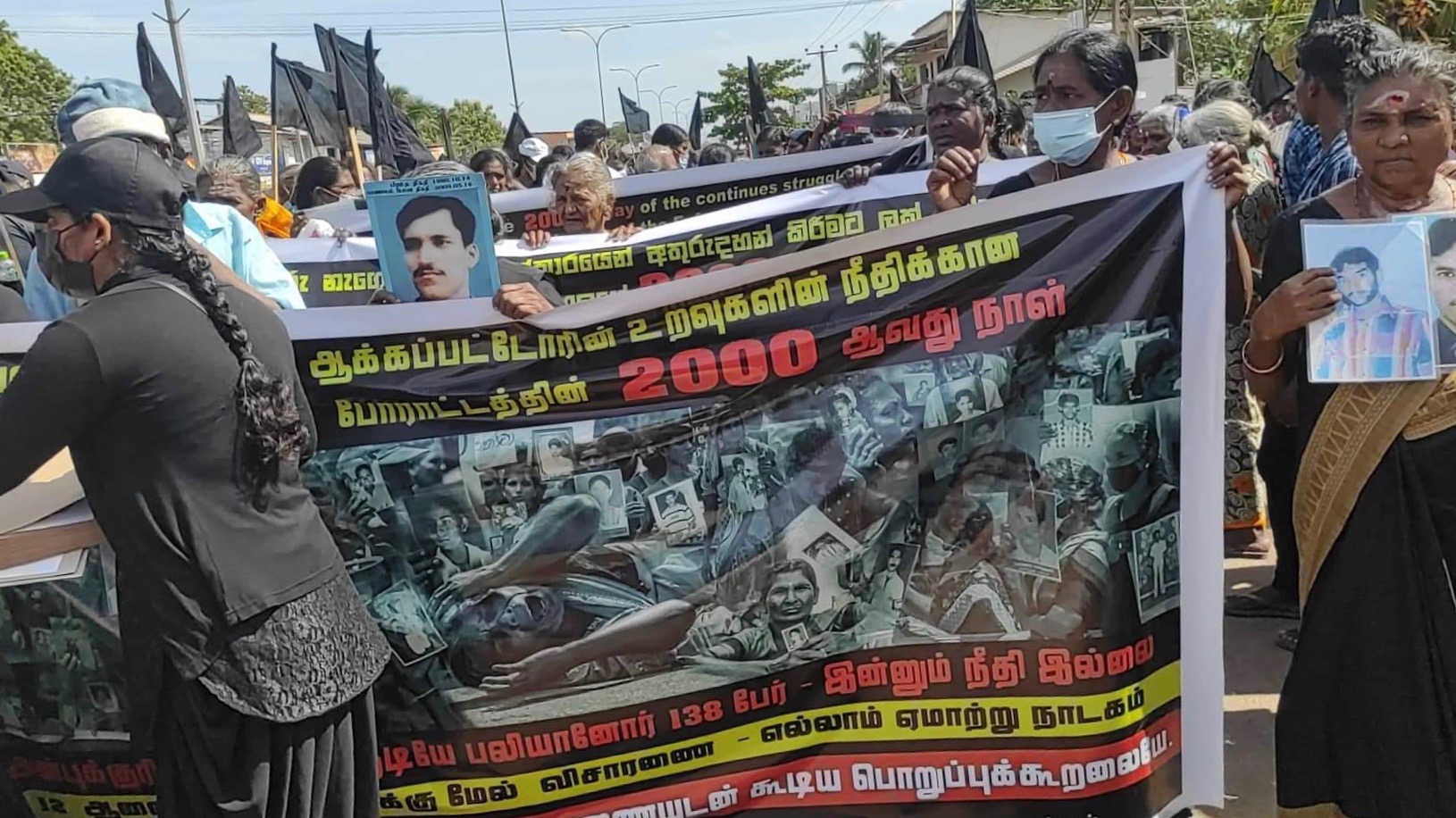Marking the 2,000th day of their struggle for justice, members of the Association of Relatives of Disappeared Persons carried out a peaceful rally in Sri Lanka’s Kilinochchi on Friday, August 12.
Scores of protesters demanding to know the whereabouts of disappeared persons marched from Kandasamy Temple to Depot Junction on Friday, ending with a sit-in protest. The demonstrators were wearing black forehead bands and held banners with pictures of family members, shouting “Where are our children?”
Thousands of Tamils were subjected to enforced disappearances in the final phase of the civil war in Sri Lanka. An estimated 100,000 individuals were subjected to enforced disappearances during the conflict, according to the advocacy group People for Equality and Relief in Lanka (PEARL).
In a strong show of resilience, #Tamil mothers of Association for Relatives of Enforced Disappearances in North & East marched from Kandasamy Temple to Depot Junction in #Kilinochchi to mark 2000th day in struggle for justice – the longest protest ever in the island of #SriLanka. pic.twitter.com/5bvrJHY99D
— JDS (@JDSLanka) August 12, 2022
Families of disappeared persons have been mobilizing across Sri Lanka for years, seeking to know the whereabouts of their loved ones who were picked up for investigation or kidnapped, never to return. Beginning from Kilinochchi, the campaign spread across Vavuniya, Trincomalee, Mullaitivu and Maruthankerny.
Facing years of mental trauma in their struggle for justice, the family members of victims of enforced disappearances have also witnessed increasing levels of threats, harassment, state intimidation, as well as physical attacks as recently as this month.
According to local reports, at least 138 relatives of persons subjected to enforced disappearances have died while struggling to establish the fate of their relatives.
In its report, Amnesty International estimated that “between 1989 and 1990 tens of thousands of Sinhalese young people suspected of affiliation with the Janatha Vimukthi Peramuna (JVP) were killed or forcibly disappeared by government-operated death squads.”
The protesters sent a letter to the United Nations Human Rights Council ahead of its September session demanding an international investigation. Earlier, in February, the Association for Relatives of Enforced Disappearances, North and East, signed a letter calling for the situation in Sri Lanka to be referred to the International Criminal Court.
"we want justice" #Protest #Kilinochchi #srilanka #Disapiarances pic.twitter.com/JjqFSxhVWO
— Vikalpa (@vikalpavoices) August 12, 2022
The previous Rajapakasa-led government in the country had assured the victims that justice will be delivered and those responsible for the rights violations will be held accountable. Former President of Sri Lanka Chandrika Bandaranaike Kumaratunga in June 2016 acknowledged having received at least 65,000 complaints of disappearances since 1995.
However, families of disappeared persons have claimed that the governments have exploited their suffering. The Sri Lankan judiciary too has shown this discriminatory attitude they claim.
Different human rights organizations including People for Equality and Relief in Lanka, Amnesty International, and Journalists for Democracy in Sri Lanka (JDS) have recommended that authorities in Sri Lanka prioritize the findings and recommendations of the Consultation Task Force and recognize the overwhelming demand of the victims for truth and justice, as well as provide interim measures for individuals in need of urgent relief.





